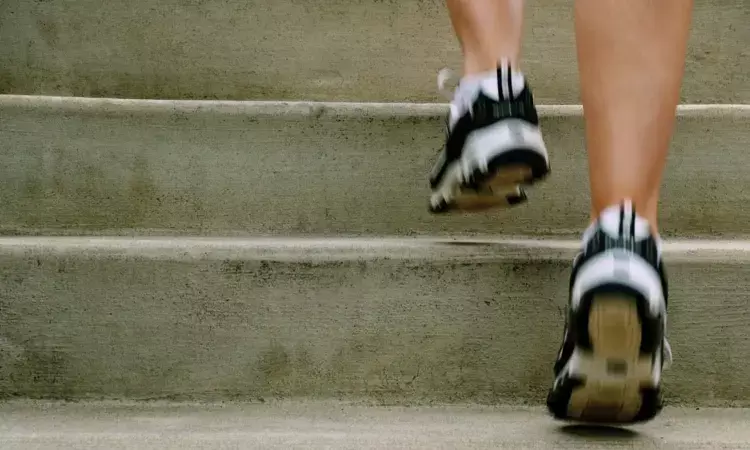- Home
- Medical news & Guidelines
- Anesthesiology
- Cardiology and CTVS
- Critical Care
- Dentistry
- Dermatology
- Diabetes and Endocrinology
- ENT
- Gastroenterology
- Medicine
- Nephrology
- Neurology
- Obstretics-Gynaecology
- Oncology
- Ophthalmology
- Orthopaedics
- Pediatrics-Neonatology
- Psychiatry
- Pulmonology
- Radiology
- Surgery
- Urology
- Laboratory Medicine
- Diet
- Nursing
- Paramedical
- Physiotherapy
- Health news
- Fact Check
- Bone Health Fact Check
- Brain Health Fact Check
- Cancer Related Fact Check
- Child Care Fact Check
- Dental and oral health fact check
- Diabetes and metabolic health fact check
- Diet and Nutrition Fact Check
- Eye and ENT Care Fact Check
- Fitness fact check
- Gut health fact check
- Heart health fact check
- Kidney health fact check
- Medical education fact check
- Men's health fact check
- Respiratory fact check
- Skin and hair care fact check
- Vaccine and Immunization fact check
- Women's health fact check
- AYUSH
- State News
- Andaman and Nicobar Islands
- Andhra Pradesh
- Arunachal Pradesh
- Assam
- Bihar
- Chandigarh
- Chattisgarh
- Dadra and Nagar Haveli
- Daman and Diu
- Delhi
- Goa
- Gujarat
- Haryana
- Himachal Pradesh
- Jammu & Kashmir
- Jharkhand
- Karnataka
- Kerala
- Ladakh
- Lakshadweep
- Madhya Pradesh
- Maharashtra
- Manipur
- Meghalaya
- Mizoram
- Nagaland
- Odisha
- Puducherry
- Punjab
- Rajasthan
- Sikkim
- Tamil Nadu
- Telangana
- Tripura
- Uttar Pradesh
- Uttrakhand
- West Bengal
- Medical Education
- Industry
10 minutes of stair-stepping lowers blood sugar and improves insulin sensitivity: Study

USA: Moderate-intensity stair walking for as little as 3 minutes can lower blood sugar and insulin levels, and 10 minutes of stepping is needed to increase insulin sensitivity, a recent study has revealed. Further, stair-stepping for 1, 3, or 10 minutes did not improve antioxidant capacity. The study appears in the journal Nutrition, Metabolism and Cardiovascular Diseases.
Jeff Moore, School of Exercise and Nutritional Sciences, San Diego State University, San Diego, CA, USA, and colleagues conducted the study with the objective of examining the effect of moderate-intensity stair-stepping exercise on the glycemic response, and antioxidant capacity (TAC) during an oral glucose tolerance test (OGTT).
For this purpose, 30 participants (women = 12) were made to complete 4 OGTTs during rest or stair walking bouts of 1, 3, and 10 min in a randomized order. During the OGTT, blood was collected at baseline and 30 min and analyzed for glucose, insulin, TAC, and lactate.
Based on the research, the authors found the following:
- Glucose concentrations were decreased following the 10 min (−22.69 mg/dL) and 3 min (−15.37 mg/dL) bouts but not the 1 min bout (−6.18 mg/dL).
- Insulin concentrations were decreased following the 10 min (−6.11) and 3 min (−2.589 μIU/dL) bouts but not the 1 min bout (−0.37 μIU/dL).
- Insulin sensitivity index values showed a significant increase in the 10-min trial (1.81), but not during the 3 min (0.65) or 1 min trial (0.13).
- There was no omnibus effect for trial in TAC (p = 0.132, η2 = 0.07).
- There was no interaction between trial and time for blood lactate (p = 0.621, η2 = 0.02).
To conclude, short duration, moderate-intensity stair-stepping leads to a decrease in peak postprandial glucose and insulin levels with as little as 3 min but longer (10 min) stepping is needed to also increase insulin sensitivity following a standard glucose challenge. This intervention had no effect on total antioxidant capacity (TAC).
Reference:
The study titled, "Three minutes of moderate-intensity stair walking improves glucose and insulin but not insulin sensitivity or total antioxidant capacity," was published in the journal Nutrition, Metabolism and Cardiovascular Diseases.
Dr Kamal Kant Kohli-MBBS, DTCD- a chest specialist with more than 30 years of practice and a flair for writing clinical articles, Dr Kamal Kant Kohli joined Medical Dialogues as a Chief Editor of Medical News. Besides writing articles, as an editor, he proofreads and verifies all the medical content published on Medical Dialogues including those coming from journals, studies,medical conferences,guidelines etc. Email: drkohli@medicaldialogues.in. Contact no. 011-43720751


